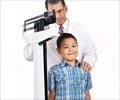Children and teenagers that took what specialists call second generation anti-psychotic medicine were at risk for obesity, according to a study in a US journal out Wednesday.
Children and teenagers that took what specialists call "second generation" anti-psychotic medicine were at risk for obesity, according to a study in a US journal.
Children and teens in the United States diagnosed with psychotic and bipolar disorders, as well as mood disorders, are often prescribed second-generation antipsychotic medications such as aripiprazole, olanzapine, quetiapine, and risperidone.The study in the Journal of the American Medical Association (JAMA) looked at 272 patients between the ages of four and 19 who had not earlier taken such medicine.
The effects "are particularly problematic during development because they predict adult obesity, the metabolic syndrome, cardiovascular morbidity, and malignancy," wrote the study authors, which included Christoph Correll, from the Zucker Hillside Hospital in Glen Oaks, New York.
Of the patients in the study group, 49 percent had mood issues, 30 percent were diagnosed with schizophrenia, and 22 percent diagnosed with disruptive or aggressive behavior.
Fifteen patients who refused to participate or did not take their medicine served as a comparison group.
Patients were treated with one of the aforementioned medicine for 12 weeks.
Advertisement
"Each antipsychotic medication was associated with significantly increased fat mass and waist circumference," the authors wrote.
Advertisement
Minors taking those medications also risked adverse side effects including raised cholesterol and triglyceride levels, and changes that could lead to diabetes and hypertension.
Increasingly, "the cardiometabolic effects" of those medications "have raised concern," the authors of the study wrote.
Source-AFP
SRM















